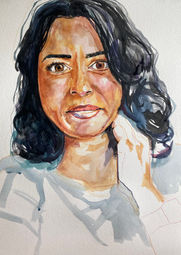Dr Nikita

In The Community With Healthcare All Around Me, 60x70cm, Oil on Canvas, 2025
This parting is part of my Women of the NHS series exploring the diverse narratives within healthcare. I engaged with female NHS workers across various sectors and locations, conducting interviews alongside visual artworks.
I interviewed Dr Nikita Kanani at her local pub, Queens of the South, a newly opened Black-owned pub. Dr Nikki brought her daughter along for the interview, which felt special. The blending of work and childcare, and normalising this action, was powerful. Dr Nikita lived what she spoke.
Dr Nikita is an award-winning NHS leader with two decades of experience across complex environments spanning health, healthcare and politics. She is a GP in south-east London and Chief Strategy and Innovation Officer, and part of the founding team of Aneira Health, a science-driven women’s health system.
Nikki described to me how she first got into medicine and how her childhood shaped her. Her dad was a refugee and her mum a migrant; they met at Sunderland Polytechnic and later moved south. They set up a pharmacy and worked long hours, meaning Nikki grew up on the side of the till in a wire shopping basket, “literally… in the community with healthcare all around me.”

Dr Nikita, ink on paper, 21 x 29.7 cm

Dr Nikita, watercolour on paper, 29.7 x 42 cm

Dr Nikita, biro on paper 40x25 cm

Dr Nikita, biro on paper 25x25 cm
This audio file represents the unedited version of our informal interview. For the research festival this interview will be edited.









